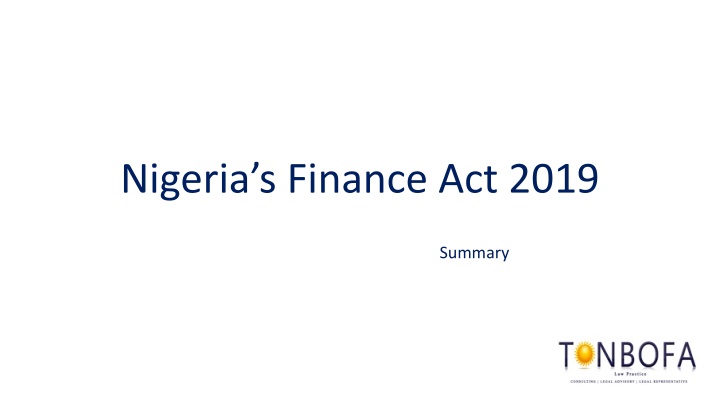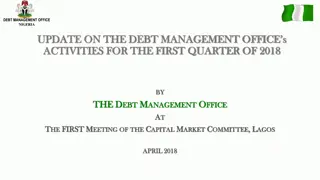Overview of Nigeria's Finance Act 2019
Nigerian Finance Act 2019 aims to reform tax laws, align with global standards, support MSMEs, incentivize investments, and boost government revenue. Key amendments include tax incentives, removal of double taxation, revised corporate tax rates, VAT adjustments, and more. The Act impacts various sectors like insurance, agriculture, and petroleum, introducing changes to taxation policies and exemptions. Stay informed about the implications of these amendments on businesses and taxpayers.
Uploaded on Feb 20, 2025 | 0 Views
Download Presentation

Please find below an Image/Link to download the presentation.
The content on the website is provided AS IS for your information and personal use only. It may not be sold, licensed, or shared on other websites without obtaining consent from the author.If you encounter any issues during the download, it is possible that the publisher has removed the file from their server.
You are allowed to download the files provided on this website for personal or commercial use, subject to the condition that they are used lawfully. All files are the property of their respective owners.
The content on the website is provided AS IS for your information and personal use only. It may not be sold, licensed, or shared on other websites without obtaining consent from the author.
E N D
Presentation Transcript
Nigerias Finance Act 2019 Summary
Introduction The Nigerian Finance Bill 2019 passed into law on 13thJanuary 2020 as The Finance Act 2019 to reform the country's tax laws, aligning them with global best practices, support MSMEs, encourage investments in infrastructure and capital markets, and increase revenue for the government. The Finance Act amends the Companies Income Tax Act, Value Added Tax Act, Custom and Excise Tariff Act, Personal Income Tax Act, Capital Gains Tax Act, Petroleum Profit Tax Act, and the Stamp Duties Act.
Amendments To Laws Requirement for Tax Identity Number as a prerequisite for opening business account. Incentives for early payment of CIT - Bonus of 2% if tax is paid 90 days before due date and 1% if tax paid within 90 days of its becoming due. Removal of double taxation- companies taxed under the CGT, PPTA or PITA will no longer be required to be charged under CITA Dividend from profit already taxed or exempted from taxation under CITA, CGTA or PPTA will no longer be subject to tax
Amendments To Laws Special Minimum tax for insurance companies removed. Insurance companies to pay 0.5% minimum Exemption of Agricultural Companies from CIT for the first 5 years renewable for 3 years Small companies- companies with less than N25million gross profit are exempted from paying tax or minimum tax but must file returns. Medium sized companies- companies with gross profit between N25m and N100m are subject to 20% CIT. Large companies - companies with gross earnings above 100m are subject to 30% tax. Dividend distributed from petroleum profits now to attract 10% withholding tax.
Amendments To Laws The Act increases VAT from 5 to 7.5% VAT exempted- locally manufactured sanitary towels, tampons; Services rendered by MFBs, Mortgage institutions and Tuition relating to nursery to tertiary education from VAT Requirement for non- resident companies to register with FIRS using address of person he has subsisting contract with for the purpose of correspondence relating to tax. FIRS may direct non-resident oil companies to deduct VAT at source and remit to the FIRS Non-resident companies to include tax on its invoice for supply of taxable services Disposal of assets during takeover of a company attracts exemption from payment of VAT, CIT and CGT for the assets disposed provided the assets are not further disposed within the next 365 days Compensation for loss of employment below N10m to be exempted from CGT Stamp duty on bank transfer to apply only on amount from N10,000 and above at N50. Transfers between the same owner s accounts in the same bank also to be exempted
Conclusion The Finance Act is a move towards a much more progressive tax system for Nigeria as it makes provisions capable of boosting the Nigerian economy through MSMEs. For More on this, contact: Uchechi Nice Nwosu. uchechi@tonbofa.com Tonbofa Eva Ashimi tashimi@tonbofa.com























